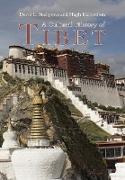A Cultural History of Tibet
BücherAngebote / Angebote:
The civilization of the Tibetan people is disappearing before our very eyes, and apart from a few gentle protests here and there, the rest of the world lets it go without comment and without regret. Many civilizations have declined and disintegrated in the past, but it is rare that one has the opportunity of being an informed witness of such events.' - The Cultural History of Tibet This revised edition of the classic work on the rapidly vanishing civilization of Tibet traces the evolution of Tibetan culture from its origins to Tibet's fall to the Chinese Communists in 1959 and the subsequent relocation of Tibetan culture and many Tibetan people. The authors illuminate the many facets of Tibetan culture, including the geography of Tibet, religion, artistic and literary development, and contemporary Tibetan politics. In discussing the history of this rich Central Asian civilization, they draw parallels with developments in historical Western Europe, as well as detail the assimilation of cultural influences from India and China. The text is illustrated with many rare photographs depicting the art, architecture, secular and sacred objects of Tibet. David Snellgrove, Ph.D., D.Litt., was Professor of Tibetan Studies at the University of London. He is a fellow of the British Academy and author of numerous books and articles on Himalayan and Southeast Asian civilizations. Since 1995 he has divided his time between homes in northern Italy and Cambodia. Hugh Richardson was in the civil and foreign services in India and was the last British/Indian Representative in Tibet (until 1950). He taught Tibetan history and language in the US and Europe, and was the author of Tibet and its History. His recent passing is eloquently eulogized in the preface of this edition. 'This welcome volume richly deserves a prominent place on the bookshelf of every serious student of Tibetan studies and interested general reader alike.' - T. V. Wylie, Journal of Asian Studies
Folgt in ca. 10 Arbeitstagen




